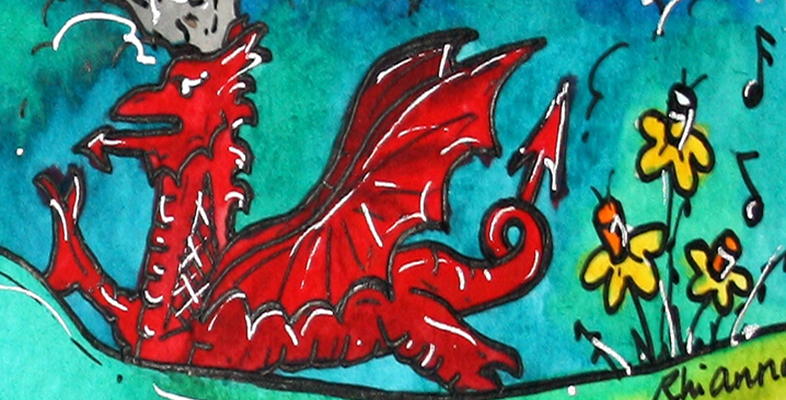1.4 Llywelyn ap Gruffydd and Owain Glyndŵr: the birth of a nation
Although Owain Glyndŵr appears to have captured the imagination of the Welsh more firmly than any of his predecessors, his actions can be seen as part of an unfolding story of national ambition. The first attempt to establish an independent Welsh principality came when the ruler of the most powerful Welsh kingdom, Gwynedd, managed to secure the allegiance of the other Welsh princes. The English King John recognised the importance of Llwyelyn Fawr (Llewelyn the Great) by offering him the hand of his daughter Joan in marriage, and in 1218 John’s heir, Henry III, confirmed Llwelyn’s claim to the Principality of Wales in the Treaty of Worcester. Despite continuing unrest and conflict, Llywelyn managed to dominate Wales until his death in 1240.

Llywelyn’s successors were less successful in holding Wales together. Gwynedd became a battleground between the claims of the Welsh and English thrones. Rivalries between and within each kingdom in Wales weakened the ability of the Welsh to resist English power, and after a series of uprisings and rebellions King Edward I was able to defeat the Welsh forces under the Prince of Wales, Llywelyn ap Gruffudd (Llywelyn the Last, or in Welsh, Llywelyn Ein Llyw Olaf (‘Llywelyn Our Last Leader’), who was killed in battle in 1282. Edward’s conquest of Wales meant that from then onwards the destinies of Wales and England were fused together, and hopes for an independent Welsh nation were suppressed. In Wales some have interpreted this as the beginning of a process of colonisation, in which Wales became the first of England’s colonial possessions.
Activity 2
Watch these two short videos on Llywelyn the Last and Owain Glyndŵr. How did Llywelyn and Owain Glyndŵr acquire the title of Prince of Wales? What were their motivations? How were their claims on the title and on the land justified? Why do you think Owain Glyndŵr has left more of a mark on Welsh imaginations than Llywelyn ap Gruffydd?

Transcript: Video 1

Transcript: Video 2
Answer
Llywelyn ap Gruffydd is recognised as Prince of Wales by the English King Henry in 1267 as part of the Treaty of Montgomery, on the condition of swearing allegiance to the King, whereas Owain Glyndŵr was proclaimed Prince of Wales nearly 150 years later by his supporters, following a dispute over land. Llywelyn is motivated by a desire to be legitimised or recognised as a ruler, by his ‘hunger for power’. Note the price he agrees to pay for it. Glyndŵr, on the other hand, is ‘pushed’ into action because his effort to have the dispute solved by the English Parliament failed. Note that Glyndŵr studied law in London and came to rebellion late, in his forties. It is interesting to compare how they both justified their claim on the title and the land. Llywelyn invokes an ancestral obligation to protect the people and the land and, by calling on the legend of Brutus, claims a connection to the land that the English cannot. Similarly, with Glyndŵr, the claim on the title and the land is justified through ancestry as a descendant of Welsh princes. As with Llywelyn, reality and myth combine to make Glyndŵr a King Arthur-like figure. You will no doubt have your views as to why Owain Glyndŵr has left more of a mark on history than Llywelyn ap Gruffydd. Maybe Glyndŵr had an ambitious, inspiring and to some extent selfless vision for a Welsh state that Llywelyn did not?
Owain Glyndŵr’s rebellion was a serious, but short-lived, assertion of the right of Wales to an independent political existence which has echoed through subsequent centuries. Six hundred years later, in 2000, celebrations were held to commemorate the anniversary of the revolt. Although much about Owain Glyndŵr ’s life remains shadowy, he is widely praised as a natural, charismatic leader, an inspiration for Welsh national aspirations, and one of the most heroic figures in Welsh history.
